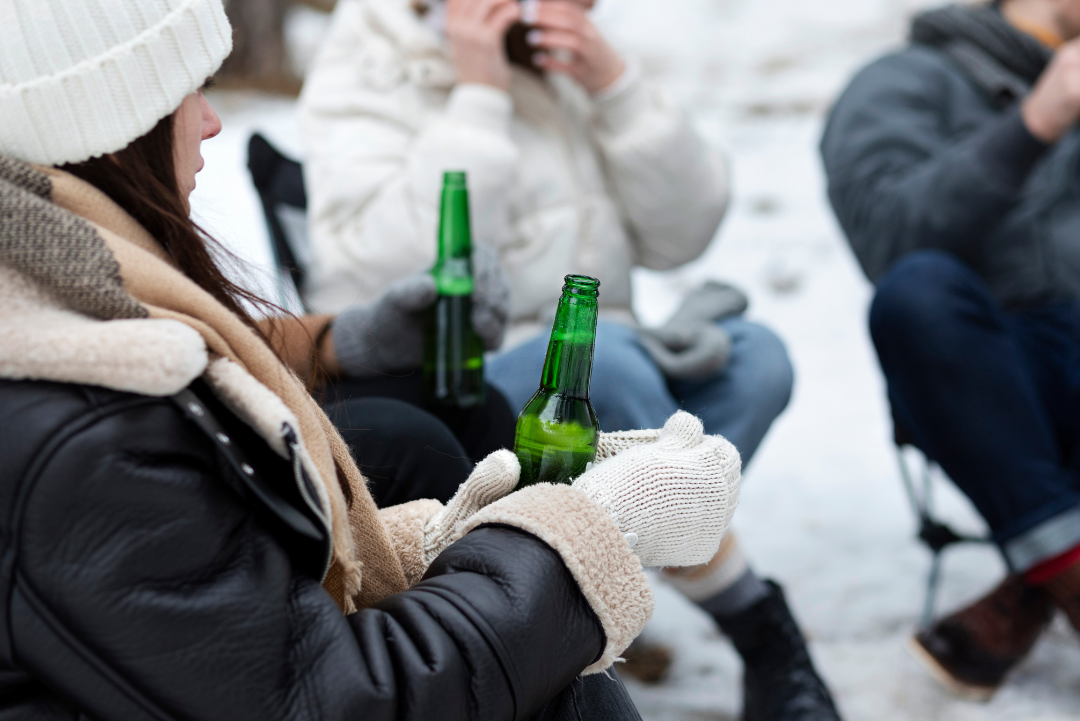Winter is a Trigger: What to Watch Out For
For many, Winter can quietly become the hardest season to navigate alcohol-free. The chill settles in, the days shorten, and suddenly that glass of red by the fire or a mulled wine on a rainy Friday night feels less like a “treat” and more like a lifeline. If you’ve ever found yourself drinking more during the Winter months - or struggling with cravings even after a long break - you’re not alone. Winter is a major trigger, and knowing what to watch out for can make all the difference.
The Psychology of Winter Drinking
It’s not just about habits. There are biological and emotional shifts that happen in winter that can intensify the urge to drink. With fewer hours of daylight, the brain produces less serotonin – the feel-good chemical that helps stabilise mood and promote calm. Low serotonin has been linked to cravings for sugar, carbs, and yes – alcohol.
At the same time, melatonin production increases as darkness sets in earlier, making us feel more sluggish and flat. That tired, low-energy state can lead us to seek out something – anything – to lift us up. And for many of us, alcohol has been that thing.
According to a 2022 study from the Australian Institute of Health and Welfare, 1 in 4 adults reported drinking more during the colder months, citing reasons like boredom, loneliness, or using alcohol as a sleep aid. And for grey area drinkers – people who don’t identify as having a “problem,” but also aren’t in a healthy relationship with alcohol – Winter can create the perfect storm.
3 Common Winter Triggers to Watch Out For
1. The “Cosy Cue”
There’s something deeply ingrained in us about winding down with a glass of wine at the end of a cold day. Fireplaces, Netflix, woolly socks… and a drink. But this “cosiness” cue is often more emotional than physical. It’s not warmth we’re craving – it’s comfort, softness, ease.
What to do: Create new rituals that still feel indulgent. A hot bath with magnesium salts, a herbal tea in your favourite mug, a soft blanket and a good book. Rewire the routine, not the reward.
2. Seasonal Sadness
Seasonal Affective Disorder (SAD) impacts around 10% of Australians, with many more experiencing milder winter blues. Depression, fatigue, and irritability can creep in during the colder months, and for those who’ve used alcohol to self-soothe in the past, it’s easy to fall back into that pattern.
What to do: Get sunlight early in the day (even 10 minutes helps), move your body daily (especially outdoors), and consider supplements like vitamin D. Check in with a practitioner if your mood feels especially low – you don’t need to push through alone.
3. Social Isolation
Winter tends to shrink our social calendars. It’s easier to cancel plans, stay in, and disconnect. And with that disconnection can come loneliness – a huge driver of drinking.
What to do: Keep connection intentional. Book in weekly phone calls with friends, join an alcohol-free online community such as The Women’s Wellbeing Collective on Facebook, or commit to a Winter wellbeing challenge. Accountability and support go a long way during these quieter months.
A Quiet Rise in Winter Drinking
Let’s talk honestly for a moment. Grey area drinking often flies under the radar. You’re still going to work. You’re still showing up. But inside, things might feel more unsteady than they look on the outside. You might be:
Drinking more days than not.
Finding it hard to stop after one or two.
Promising yourself “just weekends,” but blurring that line by Thursday.
And Winter? It can nudge all of those patterns forward.
The World Health Organization notes that alcohol consumption tends to spike in colder climates and seasons, particularly in countries with longer winters. While Australia doesn’t face freezing dark days like the far north, we still experience that psychological pull to drink when things feel heavy, cold, or dull.
If you’re in the middle of that now, know this: it’s not about willpower. It’s about understanding the cues, the biology, and the beliefs that pop up - and choosing to respond differently.
5 Questions to Ask Yourself This Winter
To bring a little awareness into your Winter routine, try reflecting on these:
Am I using alcohol to create a sense of warmth, connection, or ease?
What does “cosiness” mean to me - and how else can I create it?
How do I feel the morning after drinking during Winter? Energised or foggy?
What rituals could replace the 5pm wine this season?
Who can I reach out to for support, encouragement, or a Winter accountability buddy?
A Season for Rebuilding, Not Retreating
Here’s the truth: Winter doesn’t have to be a setback. It can be a powerful time to rebuild your habits, restore your nervous system, and get crystal clear on what you want life to feel like - without relying on alcohol to get there.
It’s okay to slow down. It’s okay to feel more tired. But it’s also okay to ask for more: more energy, more clarity, more mornings that feel good.
And if you slip? That doesn’t mean you’ve failed. It means you’re human. Get curious, not critical. Ask yourself what you needed in that moment - and how you can meet that need differently next time.
Join The Women’s Wellbeing Collective here for connection and warmth through Winter, and beyond. For strategy and support, read my book Beyond Booze How To Create A Life You Love Alcohol Free here.

